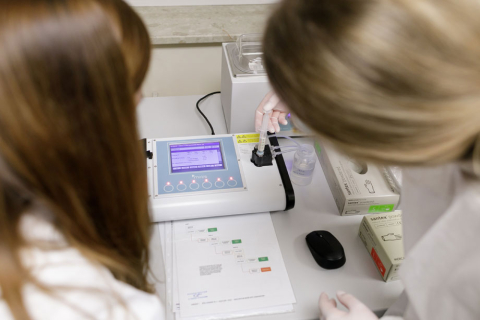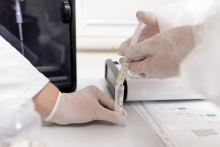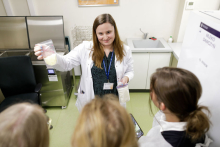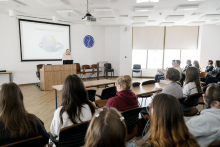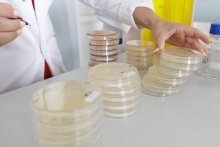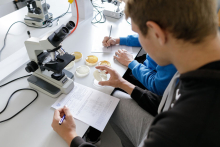What do pickled cucumbers, cabbage or beets have "inside"? What are fermentation microorganisms and what do they look like? This is what the participants of the festival lesson, led by Dr. Sylvia Jarzynka of the Department of Medical Biology, were able to find out. In the laboratory, through the use of microscopes, the young people learned about the bacteria and fungi that make up the "micro-world" of pickles. And this was just one of seven meetings that scientists from the Faculty of Health Sciences MUW prepared for festival participants.
- The purpose of popularizing science is to encourage people to discover on their own the world and the laws that govern it, to fight against fake news, to appreciate the value and importance of knowledge and education. Undoubtedly, personal encounters with scientists, lecturers during the Science Festival affect the emotions of the participant, which help to remember the transmitted content more than a post read on social media - says Małgorzata Witkowska-Zimny, MD, PhD, from the Department of Human Anatomy, coordinator of the Science Festival at the Faculty of Health Sciences MUW.
Scientists from the Department of Education and Research in Health Sciences also focused on the topic of nutrition, although no longer from a biological but from a psychological perspective. Sometimes it happens that the pleasure of eating is so strong that we lose control over what, how much and how often we eat. Mariusz Jaworski, MD, PhD, talked about when the pleasure of eating becomes an obsession and how to get out of the trap of obsessive eating. In turn, Prof. Joanna Gotlib and Aleksandra Hyży taught how to eat healthy at work in a lecture combined with a workshop. They suggested how to consciously read food labels in order to eat healthily and not spend a fortune in the process. They shared recipes for preparing healthy meals for work and ways to better choose meals from the menus of restaurants we go to during our lunch breaks.
The midwifery classes by Dr. Grazyna Bączek from the Department of Obstetrics and Gynecology Didactics were of great interest. The presenter showed the multifaceted nature of the process of human development and birth. Procreative health, intrauterine development of the human being, preparation for childbirth, care of the parturient and the newborn, breastfeeding and the beginnings of parenthood - the participants of the festival could also hear about this.
Aleksandra Wesołowska, MD, PhD, and Dr Agnieszka Bzikowska-Jura from the Department of Medical Biology, invited the audience to the University's Laboratory for Research on Breast Milk and Lactation as part of "An Evening with Science." Among other things, participants learned about the laboratory processes that milk undergoes before it reaches a patient in need. Scientists also performed demonstration analyses of the composition of breast milk samples.
The festival also included a meeting on cancer prevention and the use of modern technologies and innovative therapies in oncology, led by Anna M. Badowska-Kozakiewicz, MD, PhD, from the Department of Cancer Prevention.
In addition, Mariusz Panczyk, MD, PhD, from the Department of Education and Research in Health Sciences, took part in one of the main debates entitled "Modern education, i.e. what kind of education?" The panel discussion was moderated by Małgorzata Witkowska-Zimny, MD, PhD. The guests discussed how knowledge about learning and social change affects the role of the teacher, lecturer at all stages of education.
- Conducting open classes as part of informal education gives great satisfaction, but it also has practical value. If we convince the public and politicians that science is useful and necessary, we have a chance to increase funding to practice it - concludes the coordinator of the Science Festival at the Faculty of Health Sciences MUW.
The 26th Warsaw Science Festival lasted from September 16 to 30. The program included more than 600 meetings from various fields of science. Festival website. Recorded lessons and meetings will be available on the Festival's YouTube channel, including a lecture by Mariusz Panczyk, MD, PhD, and Dominik Wawrzuta, MD, on applications of artificial intelligence (AI) algorithms in medicine.
